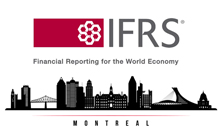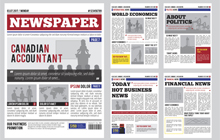Top accountant’s jump between two sustainability standards boards puts focus on new CSSB

Do recent appointments to the new Canadian Sustainability Standards Board, including new chair Charles-Antoine St-Jean, balance global standards with Canadian special interests?
 |
Charles-Antoine St-Jean has been appointed as the first-ever chair of the new Canadian Sustainability Standards Board. (Image: CPA CANADA) |
TORONTO, April 21, 2023 – Less than one year after the celebrated launch of the Montreal centre of the International Sustainability Standards Board (ISSB), its regional head has jumped ship to join the new Canadian Sustainability Standards Board (CSSB). Charles-Antoine St-Jean will lead an operation devoted to the creation of sustainability reporting standards that reflect Canadian capital markets.
While the ISSB was formed by an international accounting standards body, the CSSB is a made-in-Canada approach to sustainability reporting.
St-Jean was appointed in June 2022 as Regional Director—Americas of the ISSB. His appointment followed the fanfare inauguration of Montreal as the chosen centre for the coordination of ISSB activity across the Americas, which followed a lobbying effort by the Government of Canada and CPA Canada.
The launch was attended by Deputy Prime Minister Chrystia Freeland and IFRS Foundation Chair Erkki Liikanen, who signed a memorandum of understanding, which included investing $8 million over three years to support the creation of ISSB Montreal.
This is the second time in less than two years that St-Jean has changed positions. In July 2020 he was appointed president and CEO of Chartered Professional Accountants of Canada. A former partner at EY Canada, St-Jean served as comptroller general of Canada, chair of the Public Sector Accounting Board and, for a short time, chair of the internal corporate audit committee in the government of Ontario Premier Doug Ford. His departure from CPA Canada in March 2022 caught some by surprise when it was announced in November 2021.
A spokesperson for the IFRS Foundation told Canadian Accountant that the Foundation is currently recruiting a new ISSB Regional Director—Americas to replace St-Jean. The successful recruit would “ideally” work out of the Montreal office. While “it’s important that the incumbent has good connections to the Canadian stakeholders,” that person need not be Canadian.
The leadership of the organization remains the chair of the ISSB, Emmanuel Faber, and the executive director of the IFRS Foundation, Lee White. In addition, ISSB vice-chair Jingdong Hua is providing leadership in Montreal until the role has been assumed permanently by the incumbent, according to the Foundation.
Asked what the relationship will be between the ISSB and CSSB, the Foundation stated: “The CSSB will partner with the ISSB by supporting the uptake of ISSB Standards in Canada, highlighting key issues for the Canadian context, and facilitating interoperability between the ISSB Standards and any forthcoming CSSB Standards.”
Canadian greenwashing remains a concern
In 2022, CPA Canada asserted in Pivot Magazine that the creation of the ISSB would end the “Wild West of sustainability reporting,” as separate reporting standards were consolidated. By May 2022, recommendations from a review of standard setting in Canada called for the establishment of a Canadian sustainability standards board, with the CSSB becoming operational in April 2023.
The Ivey Centre for Building Sustainable Value raised some key questions about the CSSB in blog post in April 2022. The authors pointed out that, “in a world of multinational, cross-border capitalism,” the focus of the ISSB is “its focus on developing standards that drive global consistency and comparability of sustainability information. The more Canadian sustainability standards diverge from the international versions, the more the overall power of global standardization will be diluted.”
The tension between international standards (“wide stakeholder perspectives”) and the domestic business sector (“special interests”), according to the authors, is “always a tough balance to get right.” (The Ivey Centre for Building Sustainable Value did not respond to requests for comment for this article.)
Will the fossil fuel industry dilute sustainability standards?
With the appointment of St-Jean, the CSSB announced the appointment of three initial members of the CSSB:
- From CIBC, Bindu Dhaliwal, Senior Vice-President, Corporate Governance & ESG.
- From Manulife Investment Management, Alyson Slater, Managing Director and Head of Sustainable Investment in Canada, Public Markets.
- From TC Energy Ltd., Raylene Whitford, Chair, Indigenous Advisory Council.
In a recent report that made headlines internationally, Canadian banks were labelled “lenders of last resort” to the fossil fuel industry. Banking on Climate Chaos found that Royal Bank of Canada (RBC) ranks first as the worst financier of fossil fuels in the world, while CIBC was the third highest financier of tar sands oil production.
According to a 2022 report by the National Observer, Manulife is one of the country’s largest investors in coal production, the dirtiest fossil fuel and the single largest source of global temperature rise. In 2022, Manulife held $5.5 billion worth of investments, more than in 2021, and third only in coal financing to Sun Life and RBC.
Finally, TC Energy, formerly TransCanada Corporation, is one of the largest natural gas companies in the world. The company’s dominant shareholder is RBC. It has been a key target of global environmental and Indigenous activism against oilsands production and natural gas pipelines. The company has a long history of environmental violations and abandoned plans for the Keystone XL Pipeline in 2021.
Critics have contended that Canada is a “a low-regulation jurisdiction” that lacks adequate rules around investing in an era of climate change. In the fall of 2021, the Canadian Securities Administrators — the national umbrella group of provincial securities regulators — released for comment a set of proposed rules for climate-related disclosure requirements. One year later, both the ISSB and the American Securities and Exchange Commission, under the Biden Administration and its focus on climate change, had proposed their own, more robust standards.
According to the Final Report of the Independent Review Committee on Standard Setting in Canada, standard setting costs are projected to increase by $10 million to fund the creation of the CSSB, a cost that in the past was paid for through the membership fees of chartered professional accountants.
Colin Ellis is a contributing editor to Canadian Accountant. Top image: iStock. St-Jean photo: courtesy, CPA Canada.








(0) Comments